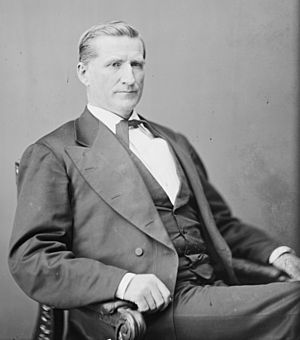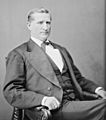John Goode (Virginia politician) facts for kids
Quick facts for kids
John Goode Jr.
|
|
|---|---|

John Goode Jr. portrait, between 1865 and 1880
|
|
| 3rd Solicitor General of the United States | |
| In office May 1885 – August 1886 |
|
| Appointed by | Grover Cleveland |
| Preceded by | Samuel F. Phillips |
| Succeeded by | George A. Jenks |
| Member of the U.S. House of Representatives from Virginia's 2nd district |
|
| In office March 4, 1875 – March 3, 1881 |
|
| Preceded by | James H. Platt, Jr. |
| Succeeded by | John F. Dezendorf |
| Chairman of the Committee on Education and Labor | |
| In office March 4, 1877 – March 3, 1881 |
|
| Preceded by | Gilbert C. Walker |
| Succeeded by | Jonathan T. Updegraff |
| Member of the Virginia House of Delegates from Norfolk County | |
| In office 1867 |
|
| Preceded by | W.H.C. Ellis |
| Succeeded by | Henry S. Bowden |
| Member of the Confederate States House of Representatives from Virginia's 6th district | |
| In office February 22, 1862 – March 18, 1865 |
|
| Preceded by | Position established |
| Succeeded by | Position abolished |
| In office 1852–1853 |
|
| Preceded by | William M. Burwell |
| Succeeded by | Jesse S. Burks |
| Personal details | |
| Born | May 27, 1829 Bedford County, Virginia |
| Died | July 14, 1909 (aged 80) Norfolk, Virginia |
| Resting place | Longwood Cemetery Bedford, Virginia |
| Political party | Democratic |
| Alma mater | Emory and Henry College Washington and Lee University School of Law |
| Occupation | Politician, lawyer |
| Military service | |
| Allegiance | Confederate States of America |
| Branch/service | Confederate Army |
| Rank | Colonel |
| Unit | Jubal Early's Staff |
| Battles/wars | American Civil War First Battle of Manassas |
John Goode Jr. (May 27, 1829 – July 14, 1909) was an important Virginia politician and lawyer. He was a member of the Democratic Party. Before the American Civil War, he served in the Virginia House of Delegates. He also voted for Virginia to leave the United States during the Virginia Secession Convention of 1861.
During the Civil War, he served in the Confederate Congress. He also worked with General Jubal Early. After the war, he moved to Norfolk. He was elected to the House of Delegates again. Then, he represented Virginia in the United States House of Representatives for three terms. Later, he was chosen to lead the Virginia Constitutional Convention of 1902. John Goode Jr. also worked as the acting Solicitor General of the United States under President Grover Cleveland.
Contents
Early Life and Family
John Goode Jr. was born in Liberty, Virginia, on May 27, 1829. This town is now called Bedford. His father, John Goode, owned a plantation. His mother was Ann Leftwich. John Jr. had several younger brothers and sisters.
His family had a history of serving their country. His grandfather, Edmund Goode, fought in the American Revolutionary War. His great-grandfather, Joel Leftwich, was a general in both the Revolutionary War and the War of 1812.
John Jr. received a good education. He went to New London Academy. In 1848, he graduated from Emory & Henry College. He then studied law at what is now Washington and Lee University School of Law.
In 1855, John Goode Jr. married Sally Urquehart. They had several children together. Their family included sons Richard, John Breckinridge, and James Urquhart, and a daughter Mary.
Starting His Career
John Goode Jr. became a lawyer in 1851. He lived with his parents on their plantation. At this time, his family used the labor of enslaved people. He also started his own law practice.
In the same year, voters in Bedford County elected him to the Virginia House of Delegates. He served one term in this role. By 1860, John Goode Jr. himself owned enslaved individuals.
Role in the Civil War
In 1861, the United States was facing a major crisis. Bedford County voters chose John Goode Jr. to attend the Virginia secession convention. This convention decided if Virginia would leave the Union.
The convention voted to leave the United States in April. Voters in Virginia approved this decision in May. Goode then volunteered to fight in the war. He joined the 2nd Virginia Cavalry as a private.
He fought at the First Battle of Manassas in July 1861. While serving in the military, he also continued his work at the Secession Convention.
Later, voters in Bedford County elected him to the First Confederate Congress and the Second Confederate Congress. He served in these roles from 1862 until the war ended. During breaks from Congress, he worked as a volunteer aide for Maj. Gen. Jubal Early.
After the War
After the Civil War, John Goode Jr. started his law practice again. He moved to the Hampton Roads area of Virginia by 1867. Like many former Confederate leaders, his full civil rights were given back to him.
He was elected to the Virginia House of Delegates again. He represented the city of Norfolk in 1866 and 1867. He continued his legal work in Norfolk and later in Washington, D.C..
Goode also served on the boards of important schools. These included the University of Virginia, William and Mary College, and the Virginia Agriculture and Mechanical College. He also wrote a book about his life called "Recollections of a Lifetime."
Serving in Congress
In 1875, John Goode Jr. was elected to the United States House of Representatives. He represented Virginia's 2nd congressional district. He served three terms in Congress, from 1875 to 1881.
During his last two terms, he was the Chairman of the Committee on Education and Labor. This committee worked on issues related to schools and jobs.
John Goode Jr. was a very active member of the Democratic Party. He helped choose presidential candidates in 1852, 1856, and 1884. He also attended the Democratic National Conventions in 1868 and 1872.
In 1885, President Grover Cleveland appointed Goode as the acting Solicitor General of the United States. He held this important legal position until August 1886.
Virginia Constitutional Convention of 1902
Even though he lived in Norfolk and Washington D.C., John Goode Jr. still had ties to Bedford County. Voters there elected him to represent them at the Virginia Constitutional Convention of 1901 and 1902. The other delegates at the convention chose him to be their president.
The convention created a new state constitution. This new constitution changed voting rules. It also made rules about education. For example, it stated that white and Black children could not attend the same schools. The new rules made it harder for many people to vote.
The delegates decided that the new constitution would go into effect without a public vote. This was different from what had been promised.
Death and Legacy
John Goode Jr. passed away in Norfolk at the age of 80. He was buried in Longwood Cemetery in Bedford, Virginia. A community in Bedford County, Goode, was named in his honor.
Images for kids
 | Claudette Colvin |
 | Myrlie Evers-Williams |
 | Alberta Odell Jones |


